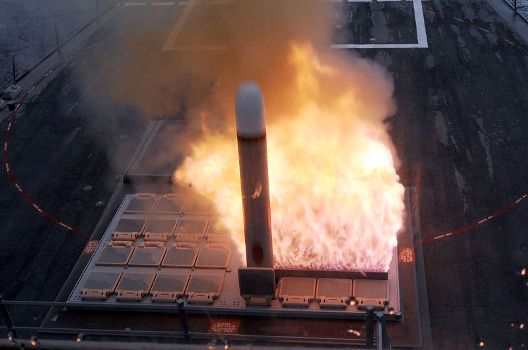 The United States appears likely to attack targets in Syria in the next few days. This has triggered speculation in policy circles and the media about possible responses from Syria, Hezbollah, and Iran. The administration has made clear that any operation would be aimed at deterring the further use of chemical weapons, not shifting the military balance in Syria’s civil war. Therefore, despite their ability to threaten US interests in Lebanon, Jordan and Israel, the United States’ regional opponents are unlikely to respond to what they will see as a passing threat. Indeed such a limited operation, ostensibly aimed at preserving US credibility, may well undermine the United States’ global standing instead.
The United States appears likely to attack targets in Syria in the next few days. This has triggered speculation in policy circles and the media about possible responses from Syria, Hezbollah, and Iran. The administration has made clear that any operation would be aimed at deterring the further use of chemical weapons, not shifting the military balance in Syria’s civil war. Therefore, despite their ability to threaten US interests in Lebanon, Jordan and Israel, the United States’ regional opponents are unlikely to respond to what they will see as a passing threat. Indeed such a limited operation, ostensibly aimed at preserving US credibility, may well undermine the United States’ global standing instead.
The current escalation is the result of miscalculations on both sides. When President Obama delivered his ‘red line’ speech a year ago, his thinking was that, by very clearly outlining the limits of what the US would tolerate from the Syrian regime, he was ensuring the regime would not take actions that would force a US intervention—something that the president clearly wants to avoid. The Syrian regime came to see it otherwise. Observing repeated warnings of the dangers of intervention in Syria from US military personnel, NATO leaders, and the president himself, the regime cannot be blamed for presuming that President Obama had been bluffing, especially after several smaller-scale incidents of chemical weapons use went unpunished. Emboldened by US risk-aversion and inaction in the face of its violence and cruelty against its population, it understandably believed that attacks that killed a few more people than usual would pass.
The regime appears to have miscalculated but not by a wide margin, judging from US statements and leaks over the past few days. These are transparently aimed at explaining what the US strikes would target, when they would occur, and what they most certainly do not aim to achieve—regime change. Presumably, the Obama administration is trying to reassure its domestic audience that the United States is not about to launch another full-scale Middle East war, but there is another objective behind its communications campaign, oriented toward a very different audience: the Syrian regime and its allies. By informing them of the operational timeframe, aims, and likely targets, the Obama administration attempts to manage their fears and expectations, reassuring them it intends to cause no serious harm, or at least none on a scale that would compel them to respond militarily. Any ambiguity would risk escalating the conflict, and trigger the very war President Obama is so adamant to avoid.
Thus, through a series of perverse, nearly surreal developments, the United States has found itself forced to respond militarily to a violation of hitherto unenforced rules, originally created to help it avoid military involvement, to preserve the credibility of threats it is going to great lengths to minimize. This begs the question: how in fact would such a cosmetic attack on Syria, so transparently intended as a proverbial slap on the wrist, strengthen US credibility?
If credibility is defined here as acting on a promise to do something, however aimlessly and grudgingly, in the face of a red line violation, then perhaps the administration can claim a victory of sorts. But are the intended recipients of this message really so naive as to be awed by such a superficial show of force? Iran, Hezbollah, and the Syrian regime are sophisticated and seasoned political players who, despite their occasional mistakes, will not confuse hollow gestures with political and military confidence. They will recognize the upcoming US attack for what it is: the reactive fumbling of an administration struggling to project a semblance of strategic coherence, and lacking the vision or resolve to exercise power responsibly in a critical and changing part of the world.
The use of chemical weapons against one’s own population, in violation of international norms and clear warnings from the Commander-in-Chief of the world’s most powerful military, is a watershed moment in the Syrian conflict. Rather than restore the United States’ standing in international relations, reacting with a symbolic US strike will show the regime that even its gravest, most egregious acts of violence, in defiance of a vastly more powerful opponent that has officially called for its removal, will elicit nothing but the empty rhetoric and aimless, cynical maneuvering that has defined US policy towards the Arab uprisings.
The Syrian regime will wait for this latest storm to pass, and promptly resume its war of annihilation by other, non-chemical means after US operations are concluded. The sort of action the United States is contemplating may well prevent the further use of chemical weapons by the regime. It will also clearly show however that President Obama’s red line was not aimed at constraining the regime’s ability to kill its population, but at exempting a reluctant leader from having to address the festering conflict in Syria. It is difficult to see the US accruing any credibility in the process.
Faysal Itani is a fellow with the Atlantic Council’s Rafik Hariri Center for the Middle East.
Image: Aug. 25, 2009, Tactical Tomahawk Cruise Missile launches from the forward missile deck aboard the guided-missile destroyer USS Farragut (DDG 99) during a training exercise. (Wikimedia/US Navy/CC license)
